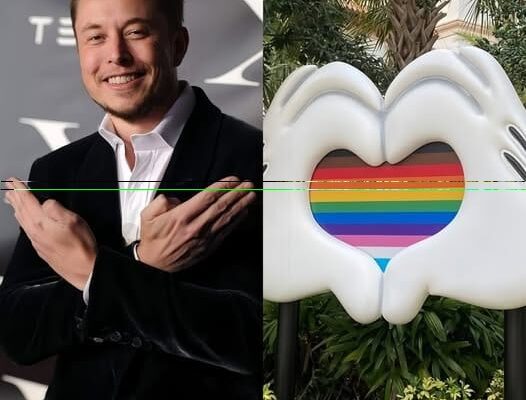In a significant development that has reverberated throughout the entertainment sector and the broader cultural landscape, Elon Musk has made a decisive statement by prohibiting Disney’s Pride content on his social media platform, X (formerly known as Twitter). Musk, a figure often associated with controversy and influence in the technology arena, appears to have established a clear boundary in the ongoing discourse between progressive ideals and traditional values in media and entertainment. His recent remarks, asserting that “woke” content is “not for kids,” have ignited intense discussions and backlash, particularly from progressive communities who perceive this as a direct affront to LGBTQ+ representation in mainstream media.
The controversy originated when Disney, one of the largest media conglomerates in the world, unveiled its Pride Month content across various platforms, including X. This content, which featured messages supporting LGBTQ+ rights, rainbow-themed visuals, and pride affirmations, aimed to celebrate and uplift marginalized communities, particularly LGBTQ+ youth. Disney has long been at the forefront of advocating for diversity and inclusion in its media offerings, from television series to films, notably with the recent inclusion of LGBTQ+ characters in major productions such as Lightyear and Strange World.
Nevertheless, Musk, whose company X has increasingly evolved into a hub for political and cultural dialogue, has made it evident that he does not endorse such content. Through a series of posts, Musk articulated his belief that “woke” ideology, which often encompasses social justice issues such as LGBTQ+ rights, racial equality, and feminism, should not be present in children’s entertainment. He further emphasized, “Woke is not for kids,” delineating a stark distinction between what he deems acceptable in children’s media and what he considers excessively politicized content.
In addition to clarifying his position through various posts, Musk has also taken definitive actions to reinforce his stance. Reports indicate that he personally blocked or removed specific Pride-related content from X, effectively silencing or reducing its visibility on the platform. This action has sparked backlash from individuals who view it as an attempt to suppress free expression, while others have praised it as a stand against what they perceive as the excessive influence of progressive ideologies in family-oriented entertainment.
Musk’s actions on X have become a source of contention, with many accusing him of utilizing the platform as a political instrument to impose his personal beliefs on the public. Some critics contend that Musk is exacerbating the polarization surrounding LGBTQ+ rights, while his supporters argue that he is merely safeguarding children from what they consider “inappropriate” content.
Disney, for its part, has maintained its commitment to LGBTQ+ inclusion, yet Musk’s actions underscore the widening rift between corporations and certain segments of society regarding the extent of diversity and inclusion initiatives. Disney’s decision to embrace Pride Month content and LGBTQ+ characters has garnered both acclaim and criticism, with some conservatives accusing the company of promoting a “woke” agenda. Musk’s actions on X only serve to intensify this ongoing cultural conflict, as corporations like Disney find themselves navigating the pressures to align with progressive values while facing backlash from more conservative audiences.
For Disney, the lingering question remains whether this controversy will have enduring repercussions on their business. Although Disney has encountered pressure from conservative groups in the past, it has consistently reaffirmed its commitment to inclusivity, particularly as a leader in global entertainment. However, with Musk’s considerable influence and substantial following on X, the implications of this situation could be significant.
Musk’s comments illustrate a wider reaction among certain conservatives and moderate individuals who view the advancement of progressive ideologies, particularly the advocacy for LGBTQ+ rights and racial justice in media, as excessive. The term “woke,” frequently employed in a derogatory manner, has evolved into a broad label for initiatives and cultural movements that challenge conventional norms and promote social justice.
For Musk, this issue has become central to his opposition against what he perceives as the encroachment of a “woke” agenda permeating various facets of society, including the media. His assertions regarding the inappropriateness of Pride content for children resonate with a growing sentiment among specific groups who contend that children should not be exposed to intricate social issues such as gender identity and sexuality at a young age. This perspective contrasts sharply with the increasing movement advocating for enhanced LGBTQ+ representation in children’s media, which seeks to normalize diverse identities and experiences from an early age.
Musk’s actions further underscore the significant influence that social media platforms like X have in shaping public discourse and driving cultural changes. While his statements have ignited controversy, they also highlight the ongoing tension between freedom of expression and the demand for regulation in the digital era. Platforms like X are increasingly perceived as battlegrounds for ideological and cultural conflicts, where users, celebrities, politicians, and corporations compete for influence over the public narrative.



